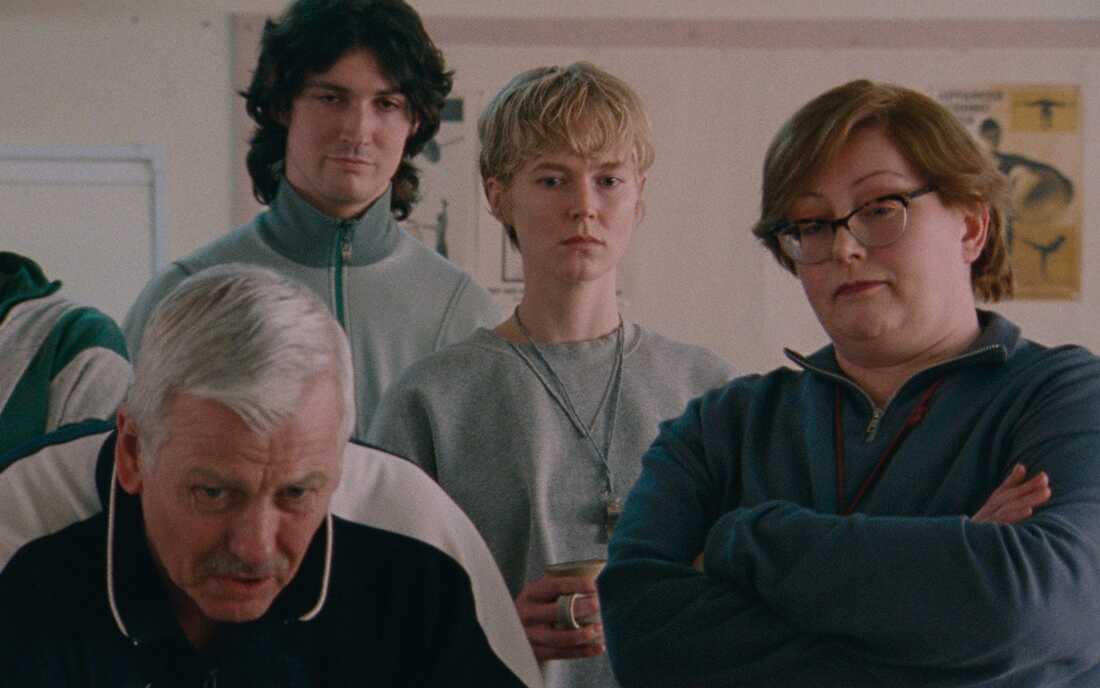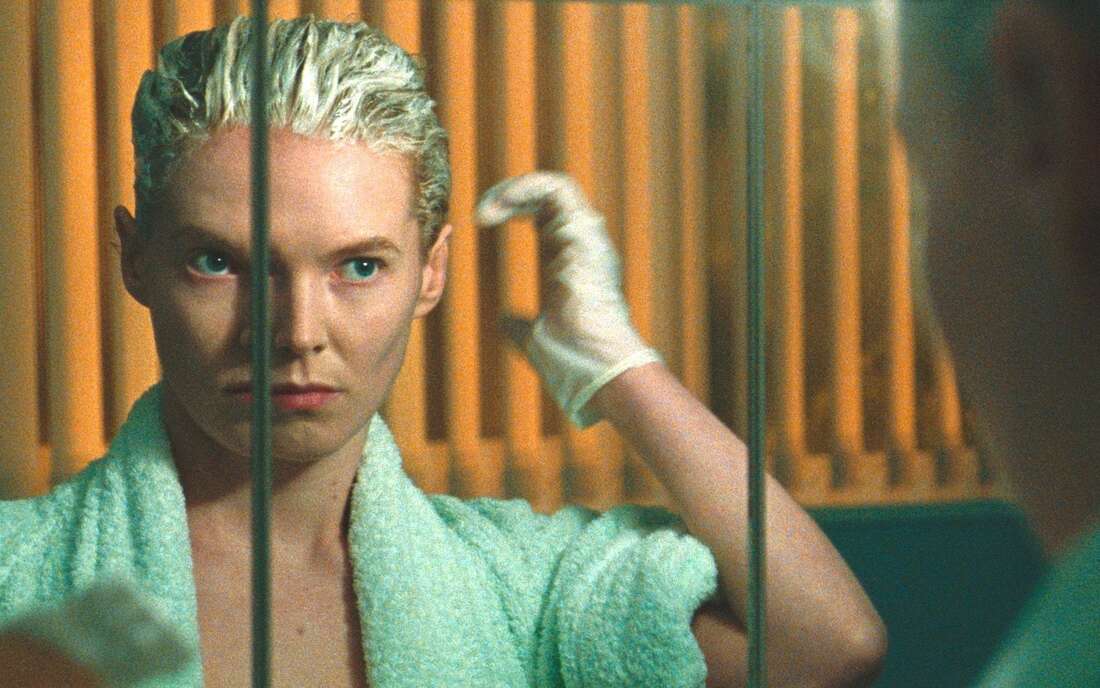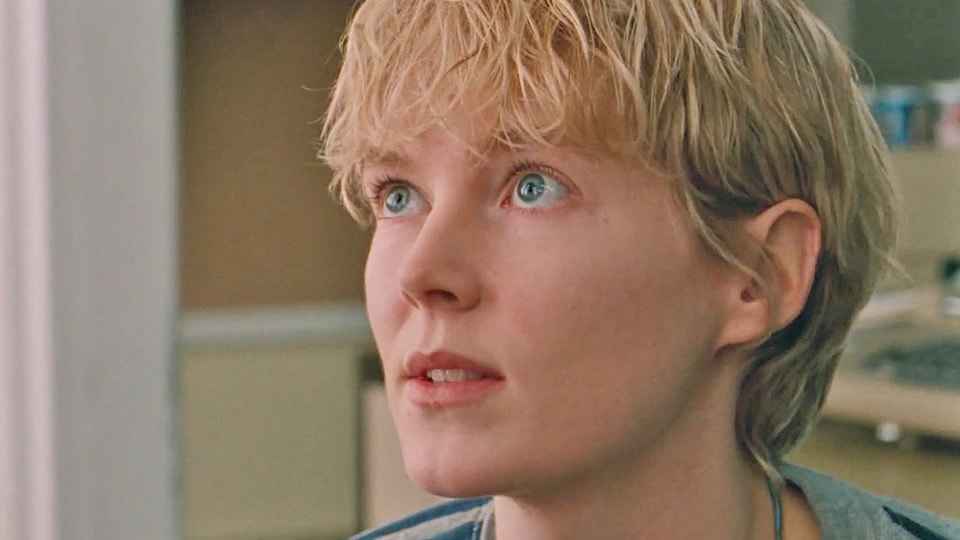After Hours Film Society Presents
Blue Jean
October 9 | 7:30 pm
CAST & CREW
Directed by Georgia Oakley
Featuring Rosie McEwen, Kerrie Hays, and Lucy Halliday
Rating: Not Rated
Runtime: 97 min.
Directed by Georgia Oakley
Featuring Rosie McEwen, Kerrie Hays, and Lucy Halliday
Rating: Not Rated
Runtime: 97 min.

Reviewed by Jude Dry | IndieWire
As difficult as it can be to look back at less accepting times in queer history, it’s even more painful how relevant it remains. Though “Blue Jean” — an acutely felt lesbian drama set during Margaret Thatcher’s regime — takes place over 30 years ago, 1980’s England could easily stand in for any conservative state today. Set against a backdrop of rising anti-gay sentiment and pending legislation, “Blue Jean” tells a political story through one woman’s strained attempts to straddle two worlds. Featuring a stirring breakout performance from the luminous Rosy McEwan, “Blue Jean” grounds the political with the personal — without losing sight of queer joy.
The film opens with a classic image of identity assertion, as puckish Jean (McEwan) bleaches her cropped hair blonde in a mirror. True to its title, she drives a vintage blue compact to school, where her popularity with students stokes jocular envy from her fellow teachers. As the girls’ net ball coach, she keeps an eye out for students with athletic potential, soon noticing coordinated outcast Lois (Lucy Halliday). A loner with curly bangs covering her eyes, Lois is an easy target for bullying, even after she proves her formidable aim.
‘Twister’ Director Jan de Bont Isn’t Sure When He’ll See Lee Isaac Chung’s Sequel
Though Jean keeps to herself at school, she really comes alive at night, where she reigns supreme over the pool table at the local lesbian pub. She has a solid crew of what can best be described as dyke friends, the most pierced leather daddy among them being her girlfriend Viv (Kerrie Hayes). Sporting a shaved head and an impressive array of titty tats, Viv is the epitome of living out, proud, and highly visible. Her studded vest and boisterous moxie no doubt add to her sex appeal, but Jean isn’t always comfortable with how much it gets them noticed in public.
The specter of the Conservative party’s Section 28 hangs over Jean’s morning cigarettes, which are punctured by radio reports of a proposed law that would prohibit the “promotion” of homosexuality as a “pretended family relationship.” If the glaring graffiti on her drive to school didn’t herald local sentiment, her colleagues voice their agreement in the teacher’s lounge. “Young people have such vulnerable minds,” says one woman, tsk-tsking her approval of the law. (The focus on minors is especially evocative of today’s attacks on trans youth.)
Jean’s unease creeps in slowly in director Georgia Oakley’s restrained slow-build drama, and McEwan translates Jean’s internal simmer with an arsenal of furtive glances, labored chirps, and subtle posture corrections. As she toggles between work and play, home and office, out and closeted, the exhaustion of constant code-switching begins to take a toll. When Jean’s student Lois appears at the bar one night (at her pool table, no less) her carefully sectioned worlds threaten to collide, sending her careening towards a breaking point of self-reckoning.
As the tension at school mounts to a boil, “Blue Jean” becomes dangerously reminiscent of “The Children’s Hour,” though Oakley mercifully steers clear of the most tragic outcomes of that lesbian classic. Jean’s internal struggle is more akin to the one in Radclyffe Hall’s “The Well of Loneliness,” which Jean is seen leafing through midway through the film.
Though “Blue Jean” has a contemporary sensibility, especially with the colorful low lights of the club and stylish short-haired characters, the story is undeniably steeped in lesbian history. The film combines artfully the legitimate need to show authentic queer life on screen — breathy sex scenes and all — with the vital importance of telling political stories during a time of renewed discrimination.
This being 2023, “Blue Jean” finds a defiant finale worthy of charming Jean’s good heart. Oakley is not out to punish her characters or belabor her points for the sake of drama. Though she’s engaging and vivid throughout the film, it’s McEwan’s performance in one late scene that mark her as a star on the rise. Exiting a suffocating party into a world of her own making, she bursts into unbridled laughter that morphs into a deep-throated cry of relief, or maybe grief. Channeling the film’s masterful build-up into a single revelatory moment, her heroic journey is complete.
As difficult as it can be to look back at less accepting times in queer history, it’s even more painful how relevant it remains. Though “Blue Jean” — an acutely felt lesbian drama set during Margaret Thatcher’s regime — takes place over 30 years ago, 1980’s England could easily stand in for any conservative state today. Set against a backdrop of rising anti-gay sentiment and pending legislation, “Blue Jean” tells a political story through one woman’s strained attempts to straddle two worlds. Featuring a stirring breakout performance from the luminous Rosy McEwan, “Blue Jean” grounds the political with the personal — without losing sight of queer joy.
The film opens with a classic image of identity assertion, as puckish Jean (McEwan) bleaches her cropped hair blonde in a mirror. True to its title, she drives a vintage blue compact to school, where her popularity with students stokes jocular envy from her fellow teachers. As the girls’ net ball coach, she keeps an eye out for students with athletic potential, soon noticing coordinated outcast Lois (Lucy Halliday). A loner with curly bangs covering her eyes, Lois is an easy target for bullying, even after she proves her formidable aim.
‘Twister’ Director Jan de Bont Isn’t Sure When He’ll See Lee Isaac Chung’s Sequel
Though Jean keeps to herself at school, she really comes alive at night, where she reigns supreme over the pool table at the local lesbian pub. She has a solid crew of what can best be described as dyke friends, the most pierced leather daddy among them being her girlfriend Viv (Kerrie Hayes). Sporting a shaved head and an impressive array of titty tats, Viv is the epitome of living out, proud, and highly visible. Her studded vest and boisterous moxie no doubt add to her sex appeal, but Jean isn’t always comfortable with how much it gets them noticed in public.
The specter of the Conservative party’s Section 28 hangs over Jean’s morning cigarettes, which are punctured by radio reports of a proposed law that would prohibit the “promotion” of homosexuality as a “pretended family relationship.” If the glaring graffiti on her drive to school didn’t herald local sentiment, her colleagues voice their agreement in the teacher’s lounge. “Young people have such vulnerable minds,” says one woman, tsk-tsking her approval of the law. (The focus on minors is especially evocative of today’s attacks on trans youth.)
Jean’s unease creeps in slowly in director Georgia Oakley’s restrained slow-build drama, and McEwan translates Jean’s internal simmer with an arsenal of furtive glances, labored chirps, and subtle posture corrections. As she toggles between work and play, home and office, out and closeted, the exhaustion of constant code-switching begins to take a toll. When Jean’s student Lois appears at the bar one night (at her pool table, no less) her carefully sectioned worlds threaten to collide, sending her careening towards a breaking point of self-reckoning.
As the tension at school mounts to a boil, “Blue Jean” becomes dangerously reminiscent of “The Children’s Hour,” though Oakley mercifully steers clear of the most tragic outcomes of that lesbian classic. Jean’s internal struggle is more akin to the one in Radclyffe Hall’s “The Well of Loneliness,” which Jean is seen leafing through midway through the film.
Though “Blue Jean” has a contemporary sensibility, especially with the colorful low lights of the club and stylish short-haired characters, the story is undeniably steeped in lesbian history. The film combines artfully the legitimate need to show authentic queer life on screen — breathy sex scenes and all — with the vital importance of telling political stories during a time of renewed discrimination.
This being 2023, “Blue Jean” finds a defiant finale worthy of charming Jean’s good heart. Oakley is not out to punish her characters or belabor her points for the sake of drama. Though she’s engaging and vivid throughout the film, it’s McEwan’s performance in one late scene that mark her as a star on the rise. Exiting a suffocating party into a world of her own making, she bursts into unbridled laughter that morphs into a deep-throated cry of relief, or maybe grief. Channeling the film’s masterful build-up into a single revelatory moment, her heroic journey is complete.









